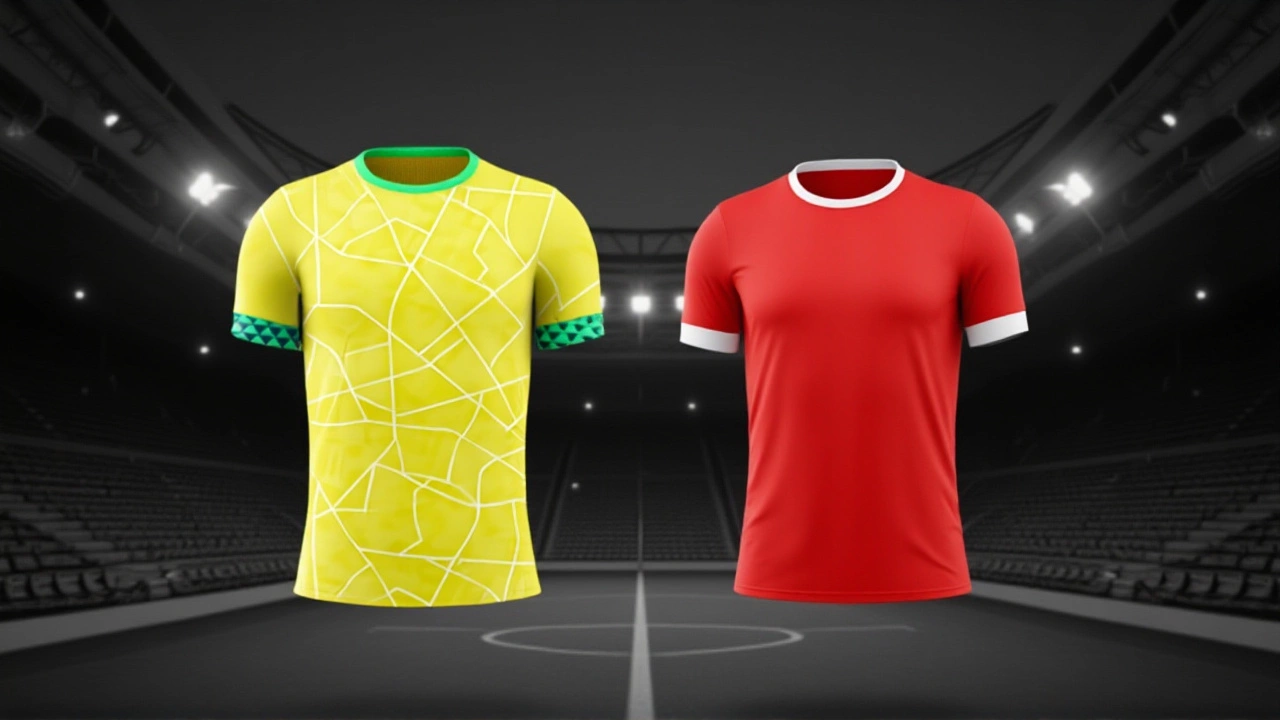When Estêvão Willian stepped up to take a penalty in the 44th minute of a tense international friendly in Lille, the weight of Brazil’s attacking frustration hung in the air. He buried it. Not just any penalty — a cool, clinical finish that canceled out Hazem Mastouri’s earlier strike for Tunisia. The final whistle blew 1-1 on Tuesday, November 18, 2025, at an unnamed stadium in northern France, leaving fans stunned: Brazil, the five-time World Cup champions, were held by a North African side that barely controlled the ball — but made every chance count.
Early Shock in Lille
Tunisia didn’t come to Lille to park the bus. They came to strike. And they did — in the 23rd minute. Hazem Mastouri, the 24-year-old forward from Espérance Tunis, pounced on a rare defensive lapse, intercepted a lazy back-pass near the edge of the box, and fired low past Bento (jersey No. 12). The goal, as beIN SPORTS USA described in their live broadcast, was "a very well taken goal," and the commentary noted Tunisia had "the majority of chances," not possession. That’s the twist: Brazil had 68% of the ball, according to unofficial tracking, but Tunisia had the sharper instincts. The North Africans defended compactly, denied space between the lines, and punished the slightest error. It was a masterclass in efficiency over dominance.Estêvão Willian’s Moment
Brazil’s equalizer came just before halftime, a gift from the referee after Vinícius Júnior (No. 7) was brought down in the box by Tunisian center-back Youssef Msakni. The call was tight — replays showed minimal contact — but the referee stood firm. Enter Estêvão Willian. At 19, he’s already being called "a superstar in the making" by beIN SPORTS. He didn’t hesitate. The ball left his right foot like a laser, low and hard to the bottom left corner. "Estab fires the ball home," the commentator shouted. "That’s a superb penalty from a superb young player." It wasn’t just about the goal. It was about timing. Brazil had been probing, pressing, circling like vultures. Rodrygo (No. 10) had a chance saved in the 12th minute. Gabriel Martinelli (No. 21) had a shot deflected wide in the 35th. But none of it mattered until Willian took that moment — and owned it.The Near-Miss That Could Have Changed Everything
The drama didn’t end at 1-1. In stoppage time, with Brazil pushing everything forward, Estêvão Willian nearly won it. At 90+5’, he cut inside from the right flank, danced past two defenders, and unleashed a right-footed curler. The ball struck the left post with a crack that echoed through the emptying stands. The assist? From Fabinho, who had come on as a substitute in the 68th minute. The ball rebounded out. Tunisia cleared. The final whistle blew.That moment — the post — says everything about Brazil’s night. They had 19 shots to Tunisia’s 5. They had 11 corners. They had the better players, the bigger names, the global spotlight. And yet, they needed a penalty to tie. And even then, they couldn’t finish it.

Tactical Battle: Clarity Over Control
Tunisia’s coach, Jalel Kadri, set up with a 4-2-3-1, sacrificing width to protect the center. His double pivot — Mohamed Drager and Aïmen Dahmen — never let Brazil’s midfielders, especially Casemiro (No. 5), find rhythm. Brazil’s Douglas Luiz Guimarães (No. 8) was constantly harassed. Meanwhile, Tunisia’s fullbacks stayed deep, and their goalkeeper, Aymen Mathlouthi, made three crucial saves, including a stunning stop on Rodrygo’s 66th-minute drive."There’s little parts of the game where Tunisia are just dragged out of shape," said the beIN SPORTS analyst. "But when they’re in shape? They’re unplayable." That’s the lesson here: Brazil’s technical superiority didn’t translate to dominance. Tunisia’s discipline did.
What This Means for Brazil’s World Cup Prep
This match was part of Brazil’s November 2025 international friendly schedule — a final tune-up before the 2026 World Cup qualifiers begin in March. The team fielded a hybrid squad: veterans like Casemiro and Marquinhos, mixed with emerging talents like Willian, Martinelli, and Luciano Juba (No. 24), who came on in the 75th minute.The concern? Over-reliance on individual brilliance. Vinícius Júnior was brilliant but isolated. Rodrygo looked sharp but lacked support. The midfield lacked a true playmaker. And the defense? Éder Militão (No. 2) and Marquinhos (No. 4) were solid, but the fullbacks — Henrique (No. 16) and Alex Sandro (No. 6, sub) — were caught out too often.
Coach Dorival Júnior will have to ask: Is this the blueprint for 2026? Or is this a warning?

What’s Next?
Brazil has two more friendlies scheduled before the end of the year — one against Japan and another against an unnamed CONMEBOL opponent — according to beIN SPORTS commentary. Tunisia, meanwhile, will turn their focus to the 2025 Africa Cup of Nations qualifiers, where they’ll need to replicate this performance against stronger sides like Senegal and Algeria.For now, Lille will be remembered not for Brazil’s dominance, but for Tunisia’s defiance. And for the moment a teenager reminded the world that football isn’t always about who has the ball — but who knows what to do with it.
Frequently Asked Questions
How did Estêvão Willian perform compared to Brazil’s stars like Vinícius Júnior?
While Vinícius Júnior was Brazil’s most dangerous attacker with 7 dribbles and 3 shots, it was Estêvão Willian who delivered the decisive moment — scoring the equalizer and nearly winning it with a post-bound strike in stoppage time. Willian’s composure under pressure, especially from the penalty spot, outshone even Vinícius’s flair. He completed 82% of his passes and made 4 key runs into the box, earning him the official Man of the Match nod from beIN SPORTS — a rare honor for a teenager against a veteran-heavy side.
Why did Tunisia’s possession stats look so low despite creating more chances?
Tunisia played a highly compact, counter-oriented system, surrendering possession to lure Brazil forward. Their midfielders stayed deep, and their forwards pressed high only when the ball entered their half. This meant Brazil had 68% possession, but Tunisia had 70% of their shots inside the penalty area. They didn’t need to control the ball — they needed to be lethal when they got it. That’s why their goal came from a single error, not sustained buildup.
What does this result say about Brazil’s World Cup readiness?
It’s a red flag wrapped in a silver lining. Brazil’s attack still relies too heavily on individual moments — Vinícius, Rodrygo, Willian — rather than fluid combinations. The midfield lacked a true creator beyond Casemiro’s defensive work. If they can’t break down organized defenses like Tunisia’s in the World Cup, they’ll struggle against teams like Spain or Portugal. But the emergence of Willian and Juba suggests depth is growing — just not yet cohesive.
Was the penalty decision controversial?
Yes. Replays showed Vinícius Júnior made minimal contact with defender Mohamed Drager, who barely brushed his ankle. The referee, from Uruguay, awarded the penalty after consulting VAR, but Tunisian coach Jalel Kadri immediately protested, calling it "a soft call." Brazil’s staff celebrated as if they’d won the game. The decision didn’t change the result, but it sparked debate: Is Brazil being rewarded for simulation? Or is the game’s trend toward protecting attackers tipping the scales?
How significant is this result for Tunisian football?
Massively. Tunisia hasn’t drawn with Brazil since 2005 — and never before in Europe. This result, against a team with 11 players from Europe’s top five leagues, proves their tactical evolution under Jalel Kadri. Mastouri’s goal was their first against Brazil since 2018. The performance could elevate their ranking, boost morale ahead of AFCON qualifiers, and attract interest from clubs for players like Mastouri and Drager, who are now on the radar of Ligue 1 scouts.
What’s the historical context of Brazil vs Tunisia matches?
Brazil and Tunisia have met just five times since 1990, with Brazil winning all but one — a 1-1 draw in the 2005 Confederations Cup. Their last meeting was in 2018, a 2-0 Brazil win in a friendly in Paris. Tunisia has never beaten Brazil in any competitive or friendly match. This 2025 draw is their best result ever against the Seleção, and the first time they’ve held Brazil to a draw outside of Africa. It’s a milestone that could reshape how African teams approach matches against traditional powerhouses.
